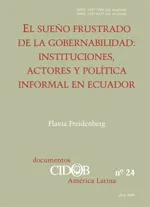The frustrated dream of governability: institutions, actors and informal policy in Ecuador.

Documentos CIDOB América Latina, n.º 24
One of the most significant features of politics in Ecuador been the difficulty in generating a governable political system, and which has seen the last few presidents failing to complete their terms of office, instead being replaced by extra-institutional channels amid scenarios of mass popular protest and agreements between elites. These political practices eroded relations between citizens and representative institutions, thereby increasing the Ecuadorians’ general disenchantment with respect to the functioning of said institutions.
The aim of this work is to describe, analyse and explain the conditions that helped to create the situation of democratic ungovernability in Ecuador during the period 1978-2007. The analysis is structured into three main sections or specific objectives: a) To describe the functioning of the Ecuadorian political system between 1976 and 2007 on different analytical dimensions (institutional design, territorial distribution of power and behaviour of political actors); b) to identify the political difficulties in reaching certain frameworks of stability in the period under analysis and c) to examine explanations as to why it is so difficult to generate a high level of governability for the political system in the framework of democracy, while seeking to determine in what way institutional design, behaviour of actors and the way in which territorial power is distributed serve to influence the low levels of democratic governability.
ISSN: 1697-7688 (print edition)
ISSN: 1697-8137 (online edition)